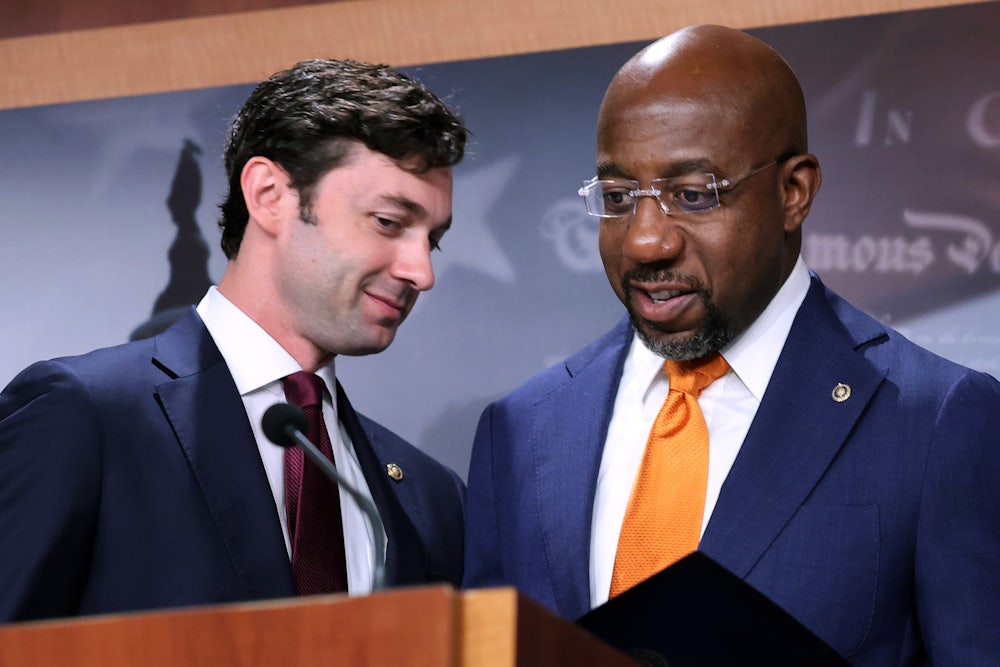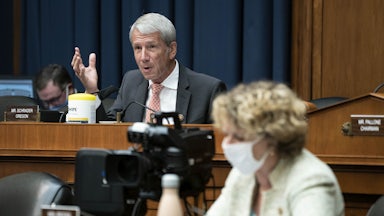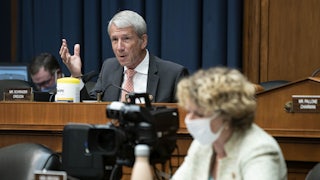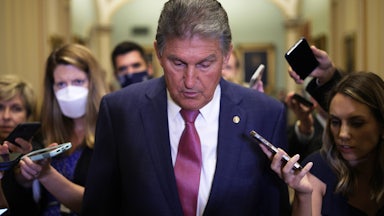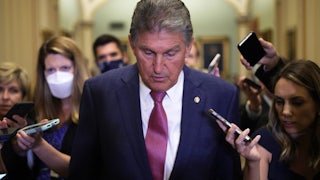With a likely lower price tag than initially anticipated, and the clock relentlessly ticking down, Democrats are scrambling to settle their ongoing debates and reach an agreement over which priorities will be included in their massive reconciliation bill and the extent to which they will be further scaled back from their already tempered ambitions.
Democratic senators emerged from a 90-minute luncheon on Tuesday praising their “spirited” meeting. Senate Majority Leader Chuck Schumer told reporters that Democratic senators’ goal was now “getting a framework done that is agreed upon by 50 senators and 218 House members” within the week. The so-called Build Back Better bill is both the centerpiece of the Biden agenda and pivotal to Democrats’ reelection argument; lawmakers have stuffed it with a slew of priorities, ranging from green infrastructure to childcare and food insecurity mitigation. But there are several remaining points of contention, including the bill’s health care provisions—and some tough choices about who will ultimately be the bill’s biggest beneficiaries.
Progressives have argued that implementing some programs at the expense of others would amount to a sort of gladiatorial combat by proxy, pitting vulnerable groups of people against each other. But with two Democratic senators remaining stubbornly unwilling to support a higher cost and a host of progressive priorities, President Joe Biden and congressional leadership may need to accede to the political realities of an evenly divided Senate.
The version of the Build Back Better Act that was marked up in the House last month included an expansion of Medicare to include hearing, dental, and vision coverage, as well as an extension of enhanced marketplace subsidies implemented by the American Rescue Plan Act in March. It would also close the Medicaid coverage gap for millions of uninsured adults. But with costs needing to be trimmed, it’s possible that one of these priorities will fall by the wayside, and Democrats may now have to face a choice that boils down to either expanding coverage for the elderly or doing so for the poor.
Gaps in federal law have long allowed the lowest-income Americans to fall through the cracks in the system and remain uninsured. The Affordable Care Act attempted to address this issue, in part by broadening Medicaid coverage to all nonelderly adults living below 138 percent of the federal poverty line, and mandating that states implement this expansion. The Supreme Court upheld the ACA in 2012 but ruled that states could choose whether or not to expand Medicaid. All but 12 states have chosen to expand Medicaid, leaving 2.2 million low-income adults without health insurance, nearly 60 percent of whom are people of color.
The 12 states that have not expanded Medicaid are Alabama, Florida, Georgia, Kansas, Mississippi, North Carolina, South Carolina, South Dakota, Tennessee, Texas, Wisconsin, and Wyoming. According to the Kaiser Family Foundation, three-quarters of people in the coverage gap live in Texas, Florida, Georgia, and North Carolina. Due to the threshold for Medicaid eligibility in nonexpansion states—a median of 40 percent of the federal poverty level for parents—many of the people in the coverage gap are also extremely low income.
According to the Center on Budget and Policy Priorities, or CBPP, parents with a family of three in a typical nonexpansion state must be earning below around $9,000 per year to qualify for Medicaid, compared to around $30,300, or 138 percent of the federal poverty line, in most expansion states. In Texas, the income eligibility for Medicaid is 17 percent of the federal poverty line—meaning that parents in a family of three with incomes just a bit higher than $3,733 would not be eligible for Medicaid.
The ACA has helped to reduce racial inequities in insurance coverage, although disparities persist. A report by the Commonwealth Fund found that states that expanded Medicaid had narrower gaps in coverage between Black and Latino people and white people than nonexpansion states. There is also evidence of lower maternal mortality rates in expansion states compared to nonexpansion states.
“Closing the coverage gap is an issue that Congress is uniquely positioned to take action on right now, because it is a policy that would really help to advance racial equity,” said Laura Harker, a senior policy analyst at the CBPP. Harker recently wrote a report arguing in favor of including a provision to close the Medicaid coverage gap in the reconciliation bill, arguing that several of the Southern states that have not expanded Medicaid have a history of discriminatory health care practices.
“We’ve seen with Medicaid in the past how people have been denied coverage, Black and brown people have been denied care in many of these states, due to a history of structural racism,” Harker said. Because most of the people in the gap are people of color, closing the Medicaid coverage gap is one of the most important proposals in terms of advancing health equity, Harker said.
Several Democratic lawmakers have already introduced legislation to close the Medicaid gap, the Medicaid Saves Lives Act. The version of the reconciliation bill approved by the House Budget Committee also includes a provision to close the gap, with a first phase starting in 2022 that would make people earning up to 138 percent of the federal poverty line eligible for subsidies to buy insurance in the federal marketplace. Starting in 2025, people in the coverage gap would transition to a federally administered Medicaid program operated by third-party contractors. In theory, nonexpansion states could choose to expand Medicaid before 2025, while the government is taking time to set up the federal “lookalike” program.
South Carolina Representative Jim Clyburn, the House Majority Whip, is one of the biggest champions of including a provision to close the gap in the reconciliation bill, and has said he would prefer that to one expanding Medicare. He has argued that while expanding Medicare would aid wealthy Americans as well as elderly people who are low income, closing the Medicaid coverage gap would specifically aid the poorest Americans, while also addressing racial inequities.
“This is not a red state/blue state issue. This is a moral issue for all Americans,” Clyburn said in an op-ed in Black Press USA last week. Senator Raphael Warnock of Georgia told The New Republic on Monday that the country has a “moral responsibility to close that gap.”
But while it may be a moral issue, it’s also inherently political. The 12 states that have chosen not to expand Medicaid are controlled by Republican legislatures, and most of them are reliably shaded red on the Electoral College map. Only three out of 50 Democratic senators represent states that have not expanded Medicaid: Warnock, and his fellow Georgia Senator Jon Ossoff, and Senator Tammy Baldwin of Wisconsin.
“Hundreds of thousands of my constituents suffer needlessly for lack of access to health care because Georgia has refused to expand Medicaid, and Senator Reverend Warnock and I are both advocating daily and vocally for inclusion of the Medicaid expansion,” Ossoff told The New Republic on Monday.
But because of this dynamic, closing the Medicaid coverage gap may be less of a priority for most senators than expanding Medicare. The bill to close the gap has six sponsors in the Senate, including Baldwin, Ossoff, and Warnock. (“We are Democrats. We support access to affordable health care for every American. People should not lose that access simply because they live in a state where Republicans are willing to hold them hostage,” Senator Elizabeth Warren of Massachusetts, one of the bill’s co-sponsors, told The New Republic last month.)
Far more House Democrats represent districts in nonexpansion states. Clyburn is also a powerful member of the House, with the ear of the Biden administration; his endorsement of Biden ahead of the South Carolina primary helped ensure the future president’s victory in that state.
The four states that have the highest number of uninsured adults are also key battlegrounds in presidential and Senate elections. Warnock, who made health care a key plank of his 2020 campaign, is up for reelection in 2022. Democrats are eager to maintain or build upon their exceedingly narrow majority in the Senate. There are also Senate seats up for grabs in Florida and North Carolina in 2022, and closing the gap could be a winning message for Democrats on the ballot.
But if it comes down to a choice between closing the Medicaid gap or expanding Medicare, it’s unclear which would come out on top. Senator Bernie Sanders has been one of the key proponents of expanding Medicare, and said last week that it was “not negotiable.” There are widespread issues with dental care for the elderly, a problem that disproportionately affects Black and Hispanic Medicare beneficiaries, according to KFF.
“In our state, for seniors, some of them have a hard time getting dental care, and that’s something we don’t often think about but is enormously important,” Senator Tom Carper of Delaware told reporters on Tuesday. (The House bill would not have phased in dental care until 2028, while vision and hearing aids would start being covered in 2023. Eliminating dental coverage from the package could be a way to shave costs.)
With negotiations ongoing, it’s hard to game out what the final health provisions in the reconciliation bill will look like. But the struggle to close the Medicaid gap will continue, regardless of whether it is included in the reconciliation package. “What I’m confident of is that I’m going to continue to fight for it,” Warnock told The New Republic.
